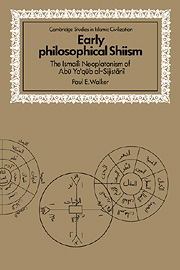Book contents
- Frontmatter
- Contents
- Preface
- Acknowledgments
- Note on transliteration
- List of abbreviations
- PART I AL-SIJISTĀNĪ'S HERITAGE
- 1 The Ismaili message and its philosophers
- 2 Religious and philosophical resources
- 3 Ismaili predecessors
- PART II AL-SIJISTĀNĪ'S UNIVERSE
- EPILOGUE: THE USE AND CONTROL OF REASON
- Notes
- Select bibliography
- Index
2 - Religious and philosophical resources
Published online by Cambridge University Press: 02 November 2009
- Frontmatter
- Contents
- Preface
- Acknowledgments
- Note on transliteration
- List of abbreviations
- PART I AL-SIJISTĀNĪ'S HERITAGE
- 1 The Ismaili message and its philosophers
- 2 Religious and philosophical resources
- 3 Ismaili predecessors
- PART II AL-SIJISTĀNĪ'S UNIVERSE
- EPILOGUE: THE USE AND CONTROL OF REASON
- Notes
- Select bibliography
- Index
Summary
It is difficult adequately to prepare a modern reader for al-Sijistānī's treatises which provide little or no introductory material – certainly no philosophical introduction of any kind – and, in fact, most often commence with seemingly obscure axioms and propositions. Seldom, if ever, do they spell out what has led up to the position from which they begin, and yet it is equally certain that a substantial history hides behind most of the topics their author chooses to discuss. Al-Sijistānī did not undertake his mission either in an intellectual vacuum or in an isolated sectarian environment. Rather, he belonged to the general, educated elite within Arabic culture; no element of that culture was inaccessible or foreign to him. On the contrary, judging from the range of his knowledge (and that of many of his fellow dā̔īs), Ismaili Shiism did not promote or harbor a policy of either ignorance or scholarly reticence about investigating the predominant intellectual movements of the time. Because al-Sijistānī deeply appreciated philosophy and science and also understood the necessity of popular religions (both Islamic and pre-Islamic), he created a significant place for all of this in his learning.
Among these factors in al-Sijistānī's background, three areas require particular consideration: Shiism, philosophy, and kalām. From within strictly the Islamic religious tradition, Shiism provided al-Sijistānī the basic framework for the majority of his principal concerns and, as a system of thought, it contributed by far the most important single influence in his writings.
- Type
- Chapter
- Information
- Early Philosophical ShiismThe Isma'ili Neoplatonism of Abu Ya'qub al-Sijistani, pp. 25 - 45Publisher: Cambridge University PressPrint publication year: 1993



